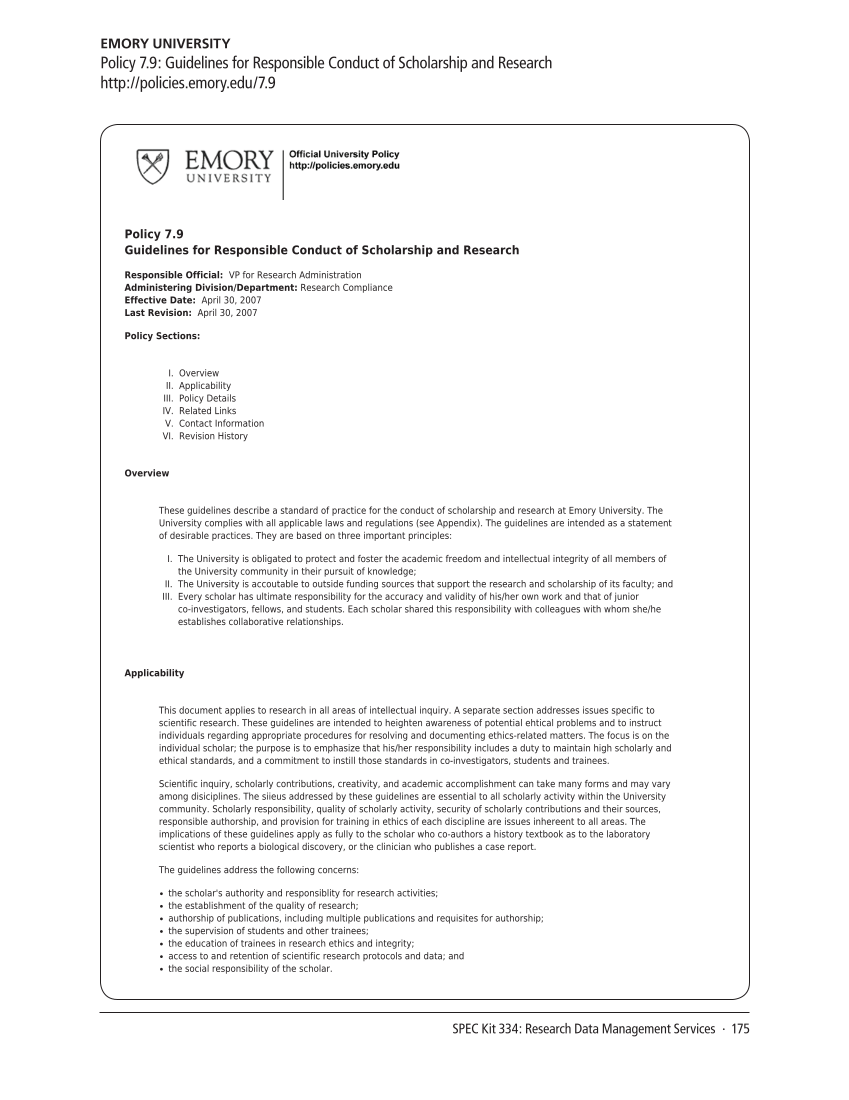SPEC Kit 334: Research Data Management Services · 175
EMORY UNIVERSITY
Policy 7.9: Guidelines for Responsible Conduct of Scholarship and Research
http://policies.emory.edu/7.9
Policy 7.9
Guidelines for Responsible Conduct of Scholarship and Research
Responsible Official: VP for Research Administration
Administering Division/Department: Research Compliance
Effective Date: April 30, 2007
Last Revision: April 30, 2007
Policy Sections:
Overview I.
Applicability II.
Policy Details III.
Related Links IV.
Contact Information V.
Revision History VI.
Overview
These guidelines describe a standard of practice for the conduct of scholarship and research at Emory University. The
University complies with all applicable laws and regulations (see Appendix). The guidelines are intended as a statement
of desirable practices. They are based on three important principles:
The University is obligated to protect and foster the academic freedom and intellectual integrity of all members of I.
the University community in their pursuit of knowledge
The University is accoutable to outside funding sources that support the research and scholarship of its faculty and II.
Every scholar has ultimate responsibility for the accuracy and validity of his/her own work and that of junior III.
co-investigators, fellows, and students. Each scholar shared this responsibility with colleagues with whom she/he
establishes collaborative relationships.
Applicability
This document applies to research in all areas of intellectual inquiry. A separate section addresses issues specific to
scientific research. These guidelines are intended to heighten awareness of potential ehtical problems and to instruct
individuals regarding appropriate procedures for resolving and documenting ethics-related matters. The focus is on the
individual scholar the purpose is to emphasize that his/her responsibility includes a duty to maintain high scholarly and
ethical standards, and a commitment to instill those standards in co-investigators, students and trainees.
Scientific inquiry, scholarly contributions, creativity, and academic accomplishment can take many forms and may vary
among disiciplines. The siieus addressed by these guidelines are essential to all scholarly activity within the University
community. Scholarly responsibility, quality of scholarly activity, security of scholarly contributions and their sources,
responsible authorship, and provision for training in ethics of each discipline are issues inhereent to all areas. The
implications of these guidelines apply as fully to the scholar who co-authors a history textbook as to the laboratory
scientist who reports a biological discovery, or the clinician who publishes a case report.
The guidelines address the following concerns:
the scholar's authority and responsiblity for research activities
uni25CF
the establishment of the quality of research
uni25CF
authorship of publications, including multiple publications and requisites for authorship
uni25CF
the supervision of students and other trainees
uni25CF
the education of trainees in research ethics and integrity
uni25CF
access to and retention of scientific research protocols and data and
uni25CF
the social responsibility of the scholar.
uni25CF
EMORY UNIVERSITY
Policy 7.9: Guidelines for Responsible Conduct of Scholarship and Research
http://policies.emory.edu/7.9
Policy 7.9
Guidelines for Responsible Conduct of Scholarship and Research
Responsible Official: VP for Research Administration
Administering Division/Department: Research Compliance
Effective Date: April 30, 2007
Last Revision: April 30, 2007
Policy Sections:
Overview I.
Applicability II.
Policy Details III.
Related Links IV.
Contact Information V.
Revision History VI.
Overview
These guidelines describe a standard of practice for the conduct of scholarship and research at Emory University. The
University complies with all applicable laws and regulations (see Appendix). The guidelines are intended as a statement
of desirable practices. They are based on three important principles:
The University is obligated to protect and foster the academic freedom and intellectual integrity of all members of I.
the University community in their pursuit of knowledge
The University is accoutable to outside funding sources that support the research and scholarship of its faculty and II.
Every scholar has ultimate responsibility for the accuracy and validity of his/her own work and that of junior III.
co-investigators, fellows, and students. Each scholar shared this responsibility with colleagues with whom she/he
establishes collaborative relationships.
Applicability
This document applies to research in all areas of intellectual inquiry. A separate section addresses issues specific to
scientific research. These guidelines are intended to heighten awareness of potential ehtical problems and to instruct
individuals regarding appropriate procedures for resolving and documenting ethics-related matters. The focus is on the
individual scholar the purpose is to emphasize that his/her responsibility includes a duty to maintain high scholarly and
ethical standards, and a commitment to instill those standards in co-investigators, students and trainees.
Scientific inquiry, scholarly contributions, creativity, and academic accomplishment can take many forms and may vary
among disiciplines. The siieus addressed by these guidelines are essential to all scholarly activity within the University
community. Scholarly responsibility, quality of scholarly activity, security of scholarly contributions and their sources,
responsible authorship, and provision for training in ethics of each discipline are issues inhereent to all areas. The
implications of these guidelines apply as fully to the scholar who co-authors a history textbook as to the laboratory
scientist who reports a biological discovery, or the clinician who publishes a case report.
The guidelines address the following concerns:
the scholar's authority and responsiblity for research activities
uni25CF
the establishment of the quality of research
uni25CF
authorship of publications, including multiple publications and requisites for authorship
uni25CF
the supervision of students and other trainees
uni25CF
the education of trainees in research ethics and integrity
uni25CF
access to and retention of scientific research protocols and data and
uni25CF
the social responsibility of the scholar.
uni25CF




























































































































































































































